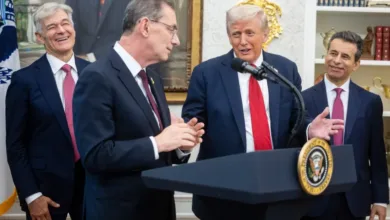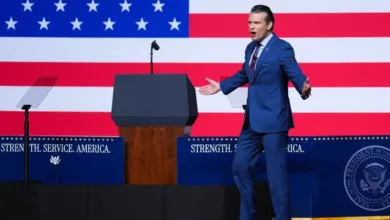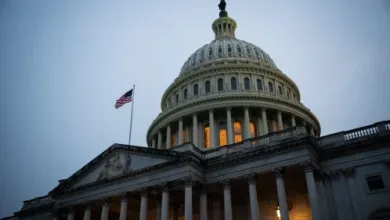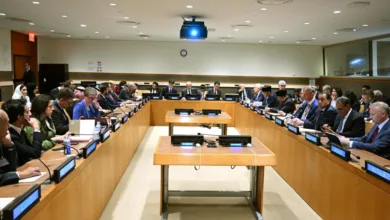U.S.–EU Trade Deal & Domestic Security Shifts: A Dual Turning Point in Transatlantic Politics and American Policy
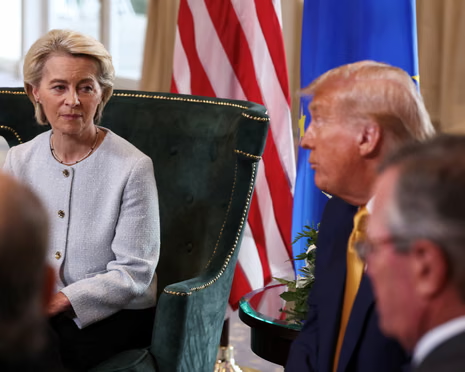
In an era marked by fast-changing geopolitics and shifting domestic agendas, two major stories dominate the headlines: the emerging U.S.–EU trade agreement shaping economic ties across the Atlantic, and the ongoing expansion of U.S. immigration enforcement. These parallel developments reflect how American leadership is navigating both global partnerships and national priorities. In this article, we will dissect the dynamics of the new trade pact that brings a surprising economic balance, as well as the domestic policy pivot exemplified by the creation of a fresh detention center in Nebraska. Together, they offer a window into present-day U.S. politics, global economics, and the evolving narrative of power and security.
A New Dawn for Transatlantic Trade
The Framework Deal
Recent developments in trade diplomacy have brought the transatlantic relationship back to center stage. The United States and the European Union appear to have struck a framework agreement that establishes a 15% tariff on most EU exports—far lower than previously threatened 30% hikes, though still above past norms. This calculated middle ground represents both a diplomatic success and a reflection of mutual dependency. The deal prioritizes stability, not confrontation, earning its place as a vital Breaking News economic moment.
Economic Balance and Global Markets
While the trade accord is less punitive than feared, it introduces new market realities. Businesses on both continents must adapt to added costs and reduced predictability. That said, peace on the trade front could free companies to focus on technology, innovation, and strategic partnerships. As such, this deal may signal a shift from trade warfare back toward economic cooperation—especially critical for battered supply chains and fragile global markets.
Strategic Implications for U.S. and Europe
For the U.S., the agreement underlines a broader nationalist trade posture while avoiding full-scale retaliation. For Europe, it provides time—and political space—to recalibrate and strengthen its own trade resilience. The pact offers a breathing room to invest in regional supply chains and balanced trade relationships. It also spotlights the urgency for both sides to diversify economic partnerships and build sustainable frameworks.
America’s Domestic Reckoning: Cornhusker Clink and Immigration Policy
Breaking Ground in Nebraska
On the domestic front, the U.S. Department of Homeland Security has announced the opening of a new migrant detention facility in Nebraska—dubbed the “Cornhusker Clink”. This marks another phase in the intensifying crackdown on undocumented immigration. The facility, capable of housing hundreds, is part of a broader approach that includes expanded vetting and enforcement powers.
Overflowing detention centers, stricter screening, and coordinated efforts with private partners signal a deeply securitized immigration policy. These moves center national security and deterrence at the heart of migration debates, merging enforcement with political symbolism at the expense of humanitarian considerations.
Integrating Political Messaging
The Nebraska detention site forms part of a broader alignment between security rhetoric and political narratives—often directed toward domestic constituencies. Positioned as a symbol of toughness against illegal entry, the new facility magnifies the administration’s focus on law and order. It doubles as political capital in electoral contexts, especially among voters concerned with border policy and national sovereignty.
Humanitarian and Operational Risks
While grounded in legal authority, the human impact cannot be ignored. Detaining asylum-seekers or undocumented individuals raises ethical alarms. Operationally, scaling up enforcement requires training, oversight, and infrastructure. Moreover, the reliance on mass immigration processing distorts public perceptions—even where due process remains essential.
U.S. Trade Strategy Meets National Security Agenda
Political Confluence
These two narratives—trade agreements and immigration enforcement—intersect at the crossroads of American politics and global strategy. The trade deal showcases America as a negotiating force capable of compromise, while the Cornhusker Clink underscores its willingness to prioritize security and control. The contrast between diplomacy abroad and enforcement at home defines current leadership.
Electoral Overtones
Seen through a political lens, both developments carry electoral implications. The trade truce may anchor moderate business support, while tough immigration tactics appeal to a law-and-order base. Together, they craft a platform of “strength and strategy”—an image that resonates with broad voter expectations amidst polarized political terrain.
International Signal
Globally, these moves send dual signals. To Europe and the world, the trade deal provides reassurance that the U.S. remains a constructive partner. Domestically, the detention policies remind Americans—and global observers—that U.S. leadership remains firmly anchored in sovereignty.
Assessing the Long-Term Stakes
Economic Forecast
A clean trade framework could stabilize markets and reduce uncertainty, but businesses must navigate lingering tariff imbalances. The deal also underscores the need for global diversification as industries cope with geopolitical volatility.
Security Posture
Domestically, policies like Cornhusker Clink raise questions about administrative reach, judicial oversight, and American values. Enforcement must proceed with transparency and care, or risk flaring tensions and international critique.
Geopolitical Balance
Together, these developments illustrate a modern U.S. strategy: steering global engagement strategically while reinforcing national control. Whether this balanced approach endures—or becomes more polarized—will define the U.S.’ posture for years to come.
The unfolding U.S.-EU trade pact and the construction of Nebraska’s “Cornhusker Clink” reflect parallel shifts in American leadership—one outward-looking, the other inward-facing. While the former demonstrates diplomatic pragmatism and economic stabilization, the latter underscores a focus on authority and enforcement. As these narratives evolve, America’s role—both on the global stage and within its borders—remains under careful watch.
These stories stand as defining moments in contemporary U.S. politics, signaling that economic cooperation and national control are not mutually exclusive, but interdependent components of a broader strategy.
